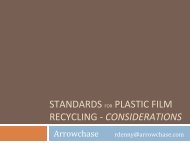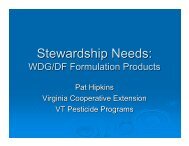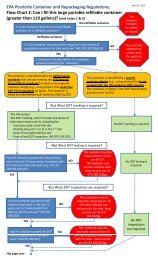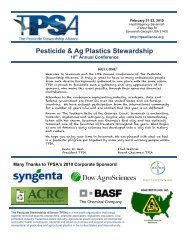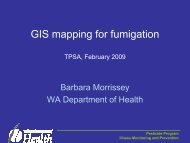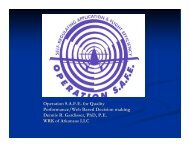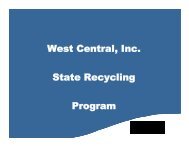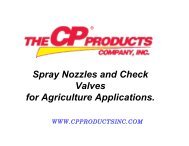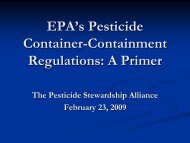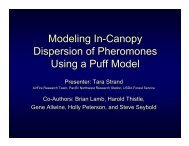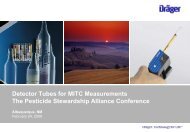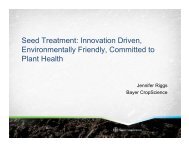Clean Sweep Programs - US Environmental Protection Agency
Clean Sweep Programs - US Environmental Protection Agency
Clean Sweep Programs - US Environmental Protection Agency
- No tags were found...
You also want an ePaper? Increase the reach of your titles
YUMPU automatically turns print PDFs into web optimized ePapers that Google loves.
The <strong>Clean</strong> <strong>Sweep</strong> ReportWhile the UWR eliminates the requirementfor participants to manifest pesticides beforetransporting them to <strong>Clean</strong> <strong>Sweep</strong> collection sites,compliance with the Department of Transportation(DOT) Hazardous Materials Regulations is stillrequired for transporting pesticides by road. Theapproaches taken by states to comply with DOTregulations vary. 1 The Massachusetts Departmentof Food and Agriculture developed an agreementwith the State Police whereby the police wouldrefrain from random road side inspections of carriersparticipating in the 1998 <strong>Clean</strong> <strong>Sweep</strong> event. InNorth Carolina, a two-year waiver from DOTregulations was secured by the Department ofAgriculture and Consumer Services to facilitatepesticide collections. In Maine, participants registertheir inventories with the Board of Pesticide Controlwhich then issues DOT shipping papers. InPennsylvania and other states using on-site pick-up,waste pesticide is collected by the contractor ateach participant’s site so participants do not have totransport it.4.2 What is the Universal Waste Rule?The Universal Waste Rule (UWR) is a set ofstreamlined hazardous waste management regulationsgoverning the collection and management ofcertain widely-generated wastes. 2 It was intendedto ease the regulatory burden on businesses;promote proper recycling or disposal of certainhazardous wastes which appear commonly in themunicipal solid waste stream, thereby reducing thehazardous waste content of municipal landfills; andprovide for collection opportunities for communitiesand businesses.EPA promulgated the UWR on May 11,1995 as an amendment to the regulations implementingRCRA (40 CFR 273), to facilitate theenvironmentally-sound collection, recycling ortreatment of batteries, certain hazardous wastepesticides, and mercury-containing thermostats. In1999, EPA published a rule adding hazardous wastelamps.The major benefits of the UWR for <strong>Clean</strong><strong>Sweep</strong> programs are that it eliminates the need forparticipants to obtain an EPA generator number andparticipants do not need a manifest to transport thepesticides to a collection site.When EPA issues a new RCRA rule, statesauthorized to implement the RCRA program mustadopt the new rule in a separate state rulemaking forit to be effective. 3 Because the UWR is lessstringent than the base or initial RCRA regulatoryprogram, state adoption is optional. EPA stronglyencourages state adoption, however, to foster bettermanagement of universal wastes in each state.Consistent programs among states will facilitate theimplementation of regional collection programs andinterstate transport of wastes. States may adopt theentire rule or portions of it, including generalprovisions; provisions for batteries, pesticides,thermostats and lamps; and provisions allowing theaddition of new universal wastes. In other words, astate may adopt all categories of waste included in1The information in this paragraph is taken from 1998 Massachusetts Pesticide Bureau Waste Pesticide General <strong>Clean</strong> Out: Final Report,prepared by the Massachusetts Department of Food and Agriculture.2Universal Waste Rule web site: http://www.epa.gov/epaoswer/hazwaste/id/univwast.htm3State authorization is a rulemaking process through which EPA delegates the primary responsibility of implementing the RCRA programto states in lieu of EPA. Currently, 49 states and territories have been granted authority to implement the base, or initial, program. Manyalso are authorized to implement additional parts of the RCRA program that EPA has since promulgated, such as Corrective Action and theLand Disposal Restrictions. State RCRA programs must always be at least as stringent as the federal requirements, but states can adoptmore stringent requirements.49



